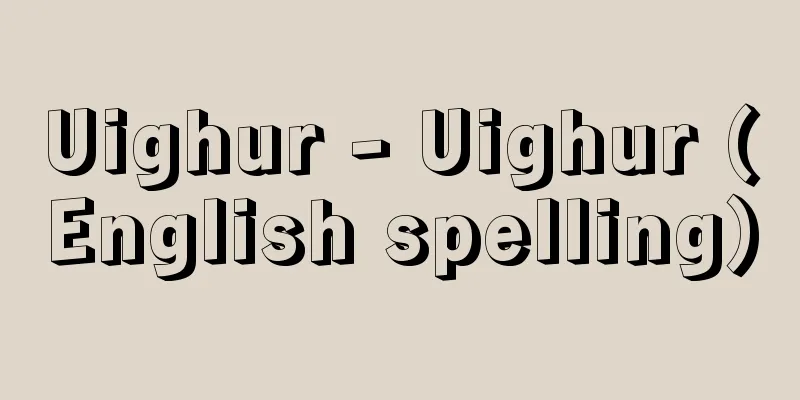Yamato Spirit - Yamatodamashii

|
A concept emphasized as the unique spirit of the Japanese people. Synonymous with wakon, yamato-kokoro, and nihon-seishin. It shows one aspect of the Japanese people's awareness of the outside world, and was asserted against China in ancient times and against the West in modern times. In the Heian period, as seen in the expression wakon kansai, it was used to refer to a uniquely Japanese way of thinking or acting, as opposed to karazae (karazae), which was detached from the real life of Japanese people, that is, knowledge and talent in Chinese studies. In the Edo period, the Japanese scholar Motoori Norinaga sought out wakon in opposition to the Confucian scholars' worship of Chinese studies, and praised the Japanese aesthetic sense and the spirit of Japanese cultural independence from Chinese thought in his poem, "If anyone asks about the Yamato-gokoro of Shikishima, it is the scent of mountain cherry blossoms in the morning sun." At the end of the Edo period, as the external crisis deepened, Sakuma Shozan, Hashimoto Sanai and others contrasted "Western art" with "Eastern morality," which was based on the idea of Yamato spirit. Yoshida Shoin's poem "I know that if I do this, this will happen, but I cannot help it" is famous as an enthusiastic expression of the spirit of action of revering the emperor and expelling the barbarians (→ Joi-ron). Under the Meiji imperial state, Yamato spirit was valued as a core element of nationalism, and Haga Yaichi and others emphasized it as loyalty to the emperor and love for the country and nature, and Nitobe Inazo further expounded it as the expansion of Bushido to a national scale. After that, it was more strongly colored as a spiritual pillar that glorified external expansion for the development of the Japanese race, and was used as a slogan to boost the morale of soldiers during the war in the Showa era. Source: Encyclopaedia Britannica Concise Encyclopedia About Encyclopaedia Britannica Concise Encyclopedia Information |
|
日本民族固有の精神として強調された観念。和魂,大和心,日本精神と同義。日本人の対外意識の一面を示すもので,古くは中国に対し,近代以降は西洋に対して主張された。平安時代には,和魂漢才という語にみるように,日本人の実生活から遊離した漢才(からざえ),すなわち漢学上の知識や才能に対して,日本人独自の思考ないし行動の仕方をさすのに用いられた。江戸時代に入り,国学者本居宣長は儒者の漢学崇拝に対抗して和魂を訪ね,「敷島のやまとごころを人問はば朝日に匂ふ山桜花」と詠んで,日本的美意識と,中華思想に対する日本文化自立の心意気をうたいあげた。幕末にいたり,対外危機の深まるなかで,佐久間象山,橋本左内らによって「西洋芸術」に対比された「東洋道徳」の思想内容は大和魂であり,吉田松陰の詠んだ「かくすればかくなるものと知りながらやむにやまれぬ大和魂」は,尊皇攘夷の行動精神を熱情的に吐露したものとして有名である(→攘夷論)。明治天皇制国家のもとでは,大和魂はナショナリズムの中核的要素として重視され,内容的にも芳賀矢一らによって天皇への忠誠,国家と自然への愛として強調され,さらに新渡戸稲造によって武士道の国民的規模への展開として説かれた。その後は日本民族の発展のための対外拡張を美化する精神的支柱としての色彩を濃くし,昭和の戦時には軍人の士気高揚のスローガンとして用いられた。
出典 ブリタニカ国際大百科事典 小項目事典ブリタニカ国際大百科事典 小項目事典について 情報 |
Recommend
Alaudidae
...Until recently, people kept these skylarks in ...
Sphaerophon
…In 1920, the Russian Léon Thérémine (1896- ) cre...
Fluctuation (English spelling)
The phenomenon in which a physical quantity fluct...
Headgear - Headgear
A general term for items that cover the head or f...
Kyoaika - Kyoaika
...Others were granted by application. According ...
Bronze ware
It broadly refers to containers, musical instrume...
Pamir Plateau - Pamir Kogen (English spelling) Памир/Pamir
A region consisting of mountain ranges and platea...
Nome (English spelling)
A small city in the U.S. state of Alaska. It is lo...
Ogasawara Noisy Animals - Ogasawara Noisy Animals
It is a type of work that includes Kabuki, Ningyo-...
Ryusen Kiln
A representative celadon kiln in China. Kiln site...
Administrative Order - Gyoseirei
...The laws of the absolute monarchy are full of ...
Emergency powers - emergency powers
The right of a nation to violate the rights or int...
Earth Tides
Changes on Earth caused by the gravitational forc...
A selection of Western medical theories
The first translation of a Western internal medici...
Yanagawa [city] - Yanagawa
A city in southern Fukuoka Prefecture. It was inco...









